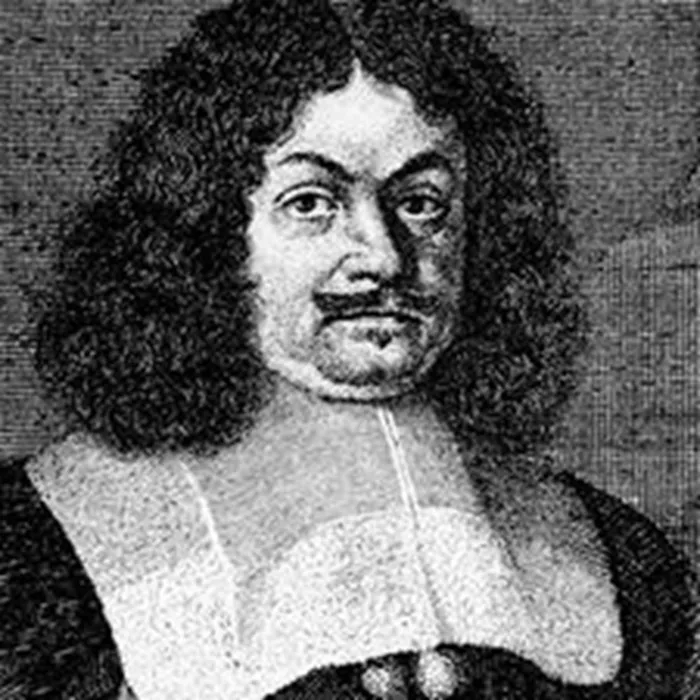
Andreas Gryphius (1616–1664) remains one of the most influential poets and dramatists of the German Baroque period. His works reflect the turbulence of his era, characterized by the Thirty Years’ War and its aftermath, offering profound meditations on mortality, faith, and the fragility of human existence. Gryphius’s poignant imagery and mastery of form secure his legacy as a cornerstone of German literature.
Andreas Gryphius Biography
Andreas Gryphius, born Andreas Greif on October 11, 1616, in Glogau (now Głogów, Poland), grew up in an era marked by strife and instability. Orphaned at an early age—his father died in 1621 and his mother in 1628—Gryphius endured a challenging childhood, shaped by the devastations of the Thirty Years’ War. Despite these hardships, he exhibited exceptional intellectual promise, pursuing an education steeped in classical and theological studies.
At the age of 16, Gryphius composed his first significant work, a collection of Latin poetry. He continued his studies in Danzig and later at the University of Leiden, where he was exposed to Dutch culture and Calvinist theology, influences that permeated his writing. His travels through Europe, including stays in France and Italy, broadened his perspective, deepening his engagement with themes of human suffering, divine providence, and the fleeting nature of earthly life.
Gryphius’s literary career flourished in the 1640s. His poetry and plays reflect his mastery of the sonnet form and his ability to capture the existential anxieties of his time. His tragedies, including Leo Armenius and Catharina von Georgien, explored themes of martyrdom and moral resilience. Gryphius married Rosina Deutschländer in 1649 and settled in his hometown, serving as a syndic (legal officer). He died on July 16, 1664, leaving behind a profound literary legacy.
Andreas Gryphius Poems
1. Sonnets:
Gryphius is best known for his sonnets, which exemplify Baroque idHeals of intricate structure and profound introspection. Poems like “Es ist alles eitel” (“All is Vanitncapsulate the transient nature of life, drawing heavily from Biblical motifs and Stoiic philosophy.
2. Tragedies:
His plays, including Leo Armenius and Catharina von Georgifen, dramatize the triumph of spiritual faith over worldly suffering. They explore historical and allegorical subjects, often emphasizing the tension between human frailty and divine strength
3. Comedies:
Gryphius’s comedic works, such as Horribilicribrifax, offer shaarp social commentary, using satire to critique contemporary moral and social decay.
4. Latin Poetry:
His early Latin poetry reflects his classical education, with themes offerudition, piety, and artistic ambition.
5. Devotional Poetry:
In works like “Tränen des Vaterlandes” (“Tears of the Fatherland”), Gryphius evokes the horrors of war while affirming hope in divine grace.
Andreas Gryphius Quotes
1.“Es ist alles eitel.” (All is vanity.)
2.“Der Mensch lebt nur eine kurze Zeit, doch trägt er Lasten von Ewigkeit.” (Man lives for but a short time, yet bears burdens of eternity.)
3.“Die Erde ist des Lebens Grab.” (The earth is life’s grave.)
4.“Wer bist du, der du die Ewigkeit begräbst im Staube?” (Who are you to bury eternity in dust?)
5.“Die Zeit flieht, und wir fliehen mit der Zeit.” (Time flees, and we flee with it.)
6.“Im Jammer lebt der Mensch, und stirbt in Furcht und Zagen.” (Man lives in misery and dies in fear and trembling.)
7.“Der Tag vergeht, die Nacht schlägt auf.” (The day fades, and night begins.)
8.“Der Geist ist willig, doch die Welt hält ihn gebunden.” (The spirit is willing, but the world binds it.)
9.“O Ewigkeit, du Donnerwort!” (O eternity, you thundering word!)
10.“Was bleibt, ist Glaube, Hoffnung, und die Liebe.” (What remains are faith, hope, and love.)
Andreas Gryphius Facts
1.Born during the Thirty Years’ War, Gryphius’s works vividly reflect the era’s chaos and despair.
2.He was proficient in Latin, German, Dutch, and French, showcasing his extensive education.
3.His real surname was Greif, but he Latinized it to Gryphius, following a common intellectual tradition of his time.
4.Gryphius is considered one of the pioneers of German sonnet writing.
5.His poem “Es ist alles eitel” is often compared to Shakespeare’s sonnets for its thematic depth and stylistic rigor.
6.He wrote extensively on the theme of vanitas, emphasizing life’s transience and the inevitability of death.
7.Gryphius’s tragedies are regarded as early examples of German Baroque theater.
8.His comedic play Horribilicribrifax is one of the earliest German-language satires.
9.He drew inspiration from European travels, particularly during his stay in Leiden, a cultural hub.
10.Gryphius’s works laid the foundation for later German literary movements, influencing writers like Johann Wolfgang von Goethe.
